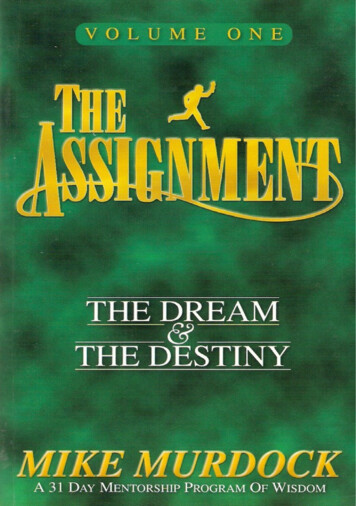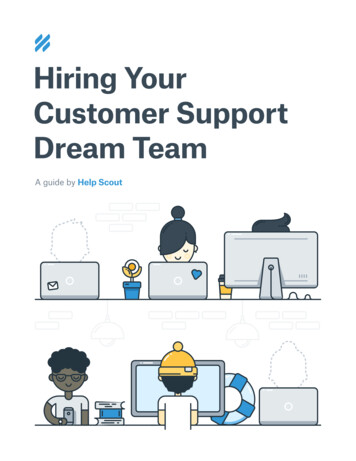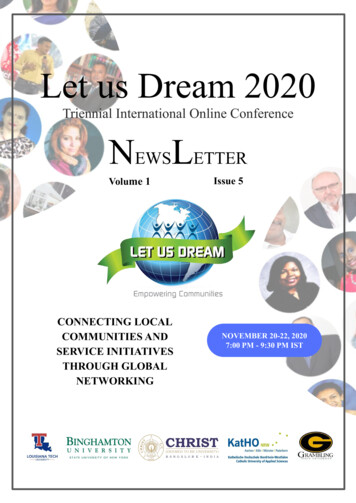![Requiem For The American Dream [Transcript]](/img/13/requiem-for-the-american-dream-transcript.jpg)
Transcription
REQUIEM FOR THE AMERICAN DREAMFeaturing Noam Chomsky[TRANSCRIPT]Text on screenNoam Chomsky is widely regarded as the most influential intellectual of our time.Filmed over four years, these are his final long-form documentary interviews.Noam Chomsky: During the Great Depression, which I’m old enough to remember - and most ofmy family were unemployed working class - it was bad, much worse subjectively than today. Butthere was an expectation that things were going to get better. There was a real sense of hopefulness.There isn’t today.Inequality is really unprecedented. If you look at total inequality, it’s like the worst periods ofAmerican History. But if you refine it more closely, the inequality comes from the extreme wealthin a tiny sector of the population, a fraction of 1 percent.There were periods like the Gilded Age in the 20s and the Roaring 90s and so on, when a situationdeveloped rather similar to this. Now, this period’s extreme - because if you look at the wealthdistribution, the inequality mostly comes from super wealth - literally, the top 1/10th of a percentare just super wealthy. Not only is it extremely unjust in itself, inequality has highly negativeconsequences on the society as a whole - because the very fact of inequality has a corrosive,harmful effect on democracy.You open by talking about the American Dream. Part of the American Dream is class mobility.You’re born poor. You work hard. You get rich. It was possible for a worker to get a decent job,buy a home, get a car, have his children go to school. It’s all collapsed.Title screenRequiem For The American DreamChomsky: Imagine yourself in an outside position, looking from Mars. What do you see?In the United States, there are professed values like democracy. In a democracy, public opinion isgoing to have some influence on policy. And then, the government carries out actions determinedby the population. That’s what democracy means.It’s important to understand that privileged and powerful sectors have never liked democracy andfor very good reasons. Democracy puts power into the hands of the general population and takesit away from them. It’s kind of a principle of concentration of wealth and power.Text on screenThe 10 Principles of Concentration of Wealth & Power 2019 Media Education Foundation mediaed.org1
Chomsky: Concentration of wealth yields concentration of power, particularly so as the cost ofelections skyrockets, which kind of forces the political parties into the pockets of majorcorporations. And this political power quickly translates into legislation that increases theconcentration of wealth. So fiscal policy like tax policy, deregulation, rules of corporategovernance and a whole variety of measures - political measures - designed to increase theconcentration of wealth and power which, in turn, yields more political power to do the same thing.And that’s what we’ve been seeing. So we have this kind of vicious cycle in progress.You know, actually, it is so traditional that it was described by Adam Smith in 1776. You read thefamous Wealth of Nations. He says in England, the principle architects of policy are the peoplewho own the society - in his day, merchants and manufacturers. And they make sure that their owninterests are very well cared for, however grievous the impact on the people of England or others.Now, it’s not merchants and manufacturers, it’s financial institutions and multinationalcorporations. The people who Adam Smith called the “masters of mankind” - and they’refollowing the vile maxim, “All for ourselves and nothing for anyone else.” They're just going topursue policies that benefit them and harm everyone else. And in the absence of a general popularreaction, that’s pretty much what you’d expect.Principle #1: Reduce DemocracyChomsky: Right through American history, there’s been an ongoing clash between pressure formore freedom and democracy coming from below, and efforts at elite control and dominationcoming from above.It goes back to the founding of the country. James Madison, the main framer, who was as much ofa believer in democracy as anybody in the world in that day, nevertheless felt that the United Statessystem should be designed, and indeed with his initiative was designed, so that power should bein the hands of the wealthy - because the wealthy are the more responsible set of men.And, therefore, the structure of the formal constitutional system placed most power in the handsof the Senate. Remember, the Senate was not elected in those days. It was selected from thewealthy. Men, who as Madison put it, “Had sympathy for property owners and their rights.”If you read the debates at the Constitutional Convention, Madison said, “The major concern of thesociety has to be to protect the minority of the opulent against the majority.” And he hadarguments. Suppose everyone had a vote freely. He said, “Well, the majority of the poor wouldget together and they would organize to take away the property of the rich.” And, he said, “Thatwould obviously be unjust, so you can’t have that.” So, therefore the constitutional system has tobe set up to prevent democracy.It’s of some interest that this debate has a hoary tradition. Goes back to the first major book onpolitical systems, Aristotle’s Politics. He says, “Of all of them, the best is democracy,” but thenhe points out exactly the flaw that Madison pointed out. 2019 Media Education Foundation mediaed.org2
If Athens were a democracy for free men, the poor would get together and take away the propertyof the rich. Well, same dilemma - they had opposite solutions. Aristotle proposed what we wouldnowadays call a welfare state. He said, “Try to reduce inequality.” So, same problem - oppositesolutions. One is reduce inequality - you won’t have this problem. The other is reduce democracy.If you look at the history of the United States, it’s a constant struggle between these two tendencies.A democratizing tendency that’s mostly coming from the population, a pressure from below, andyou get this constant battle going on, periods of regression, periods of progress. The 1960s forexample, were a period of significant democratization.Sectors of the population that were usually passive and apathetic became organized, active, startedpressing their demands. And they became more and more involved in decision-making, activismand so on. It just changed consciousness in a lot of ways.Minority rights.Malcolm XIf democracy means freedom, why aren’t our people free? (Right!) If democracy means justice,why don’t we have justice? (That's right!) If democracy means equality, why don’t we haveequality?Chomsky: Women’s rights.Gloria SteinemThis inhuman system of exploitation will change, but only if we force it to change, and force ittogether.Chomsky: Concern for the environment.Walter CronkiteA unique day in American history is ending, a day set aside for a nationwide outpouring ofmankind seeking its own survival.Chomsky: Opposition to aggression.Dr. Benjamin SpockI say to those who criticize us for the militancy of our dissent that if they are serious about law andorder, they should first provide it for the Vietnamese people, for our own black people, and for ourown poor people.Chomsky: Concern for other people.Dr. Martin Luther KingOne day we must ask the question, “Why are there 40,000,000 poor people in America?” Whenyou begin to ask that question, you’re raising a question about the economic system, about abroader distribution of wealth, the question of restructuring the whole of American society. 2019 Media Education Foundation mediaed.org3
Chomsky: These are all civilizing effects, and that caused great fear.I hadn't anticipated the power - I should of - but I didn't anticipate the power of the reaction tothese civilizing effects of the 60s. I did not anticipate the strength of the reaction to it. The backlash.Principle #2: Shape IdeologyChomsky: There has been an enormous concentrated, coordinated business offensive beginningin the 70s to try to beat back the egalitarian efforts that went right through the Nixon years. Yousee it in many respects.Over on the right, you see it in things like the famous Powell Memorandum sent to the Chamberof Commerce, the major business lobby, by later Supreme Court justice Powell - warning themthat business is losing control over the society - and something has to be done to counter theseforces. Of course, he puts it in terms of defense, “Defending ourselves against an outside power.”But if you look at it, it’s a call for business to use its control over resources to carry out a majoroffensive to beat back this democratizing wave.Over on the liberal side, there’s something exactly similar. The first major report of the TrilateralCommission is concerned with this. It’s called “The Crisis of Democracy”. Trilateral Commissionis liberal internationalists - their flavor is indicated by the fact that they pretty much staffed theCarter Administration. They were also appalled by the democratizing tendencies of the 60s, andthought we have to react to it. They were concerned that there was an “excess of democracy”developing.Previously passive and obedient parts of the population - what are sometimes called, “the specialinterests” - were beginning to organize and try to enter the political arena, and they said, “Thatimposes too much pressure on the state. It can’t deal with all these pressures.” So, therefore, theyhave to return to passivity and become depoliticized.They were particularly concerned with what was happening to young people, “The young peopleare getting too free and independent.” The way they put it, there’s a failure on the part of theschools, the universities, the churches. the institutions responsible for the “indoctrination of theyoung.” Their phrase, not mine.If you look at their study, there’s one interest they never mention, private business. And that makessense, they’re not special interest, they’re the national interest, kind of by definition. So they’reokay. They’re allowed to, you know, have lobbyists, buy campaigns, staff the executive, makedecisions - that’s fine. But it’s the rest, the special interests, the general population, who have tobe subdued.Well, that’s the spectrum. It’s the kind of ideological level of the backlash. But the major backlash,which was in parallel to this, was just redesigning the economy. 2019 Media Education Foundation mediaed.org4
Principle #3: Redesign the EconomyChomsky: Since the 1970s, there’s been a concerted effort on the part of the masters of mankind,the owners of the society, to shift the economy in two crucial respects. One, to increase the role offinancial institutions: banks, investment firms, so on. insurance companies. By 2007, right beforethe latest crash, they had literally 40% of corporate profits, far beyond anything in the past.Back in the 1950s, as for many years before, the United States economy was based largely onproduction. The United States was the great manufacturing center of the world. Financialinstitutions used to be a relatively small part of the economy and their task was to distribute unusedassets like, say, bank savings to productive activity.Archival voiceoverThe bank always has on hand a reserve of money received from the stockholders and depositors.On the basis of these cash reserves, a bank can create credit so besides providing a safe place fordepositing money, a bank serves a community by making additional credit available for manypurposes. For a manufacturer to meet his payroll during slack selling periods, for a merchant toenlarge and remodel his store, and for many other good reasons why people are always needingmore credit than they have immediately available.Chomsky: That's a contribution to the economy. Regulatory system was established. Banks wereregulated. The commercial and investment banks were separated, cut back their risky investmentpractices that could harm private people.There had been, remember, no financial crashes during the period of regulation. By the 1970s, thatchanged.You started getting that huge increase in the flows of speculative capital, just astronomicallyincrease, enormous changes in the financial sector from traditional banks to risky investments,complex financial instruments, money manipulations and so on.Increasingly, the business of the country isn’t production, at least not here. The primary businesshere is business. You can even see it in the choice of directors. A director of a major Americancorporation back in the 50s and 60s was very likely to be an engineer, somebody who graduatedfrom a place like MIT, maybe industrial management. More recently, the directorship and the topmanagerial positions are people who came out of business schools, learned financial trickery ofvarious kinds, and so on.By the 1970s, say General Electric could make more profit playing games with money than youcould by producing in the United States. You have to remember that General Electric issubstantially a financial institution today. It makes half its profits just by moving money around incomplicated ways. It’s very unclear that they’re doing anything that of value to the economy.That’s one phenomenon, what’s called financialization of the economy. Going along with that isthe offshoring of production. 2019 Media Education Foundation mediaed.org5
The trade system was reconstructed with a very explicit design of putting working people incompetition with one another all over the world. What’s its lead to is a reduction in the share ofincome on the part of working people. It’s been particularly striking in the United States but it’shappening worldwide. It means that an American worker’s in competition with the super-exploitedworker in China.Meanwhile, highly paid professionals are protected. They're not placed in competition with therest of the world. Far from it. And, of course, the capital is free to move. Workers aren’t free tomove, labor can’t move, but capital can.Again, going back to the classics like Adam Smith, as he pointed out, free circulation of labor isthe foundation of any free trade system, but workers are pretty much stuck. The wealthy and theprivileged are protected, so you get obvious consequences. And they’re recognized and, in fact,praised.Policy is designed to increase insecurity. Alan Greenspan. When he testified to Congress, heexplained his success in running the economy as based on what he called, “Greater WorkerInsecurity.”Alan GreenspanA typical restraint on compensation increases has been evident for a few years now, but as Ioutlined in some detail in testimony last month, I believe that job insecurity has played thedominant roll.Chomsky: Keep workers insecure, they’re going to be under control. They are not going to askfor, say, decent wages or decent working conditions or the opportunity of free association, meaningunionize.Now, for the masters of mankind, that’s fine. They make their profits. But for the population, it’sdevastating. These two processes, financialization and offshoring are part of what lead to thevicious cycle of concentration of wealth and concentration of power.Archival Chomsky videoI'm Noam Chomsky and I'm on the faculty at MIT and I've been getting more and more heavilyinvolved in anti-war activities for the last few years.Archival announcerNoam Chomsky has made two international reputations. The widest is as one of the nationalleaders of American resistance to the Vietnam War. The deepest is as a professor of linguisticswho, before he was 40 years old, had transformed the nature of his subject.Archival interviewerYou are identified with the new left, whatever that is. You certainly have been an activist as wellas a writer. 2019 Media Education Foundation mediaed.org6
William F. BuckleyProfessor Noam Chomsky is listed in anybody’s catalog as among the half-dozen top heroes of thenew left. The standing he achieved by adopting over the past 2 or 3 years a series of adamantpositions rejecting at least American foreign policy, at most America itself.Chomsky: Actually this notion anti-American is quite an interesting one. It’s actually a totalitariannotion. It isn’t used in free societies. So, if someone in, say, Italy is criticizing Berlusconi or thecorruption of the Italian state and so on, they’re not called anti-Italian. In fact, if they were calledanti-Italian, people would collapse in laughter in the streets of Rome or Milan.In totalitarian states the notion’s used, so in the old Soviet Union dissidents were called anti-Soviet.That was the worst condemnation. In the Brazilian military dictatorship, they were called antiBrazilian. Now, it’s true that in just about every society, the critics are maligned or mistreated.different ways depending on the society. Like in the Soviet Union, say Václav Havel would beimprisoned. In a U.S. dependency like El Salvador, at the same time, his counterpart would havetheir brains blown out by U.S. run state terrorist forces. In other societies, they’re just condemnedor vilified and so on.In the United States, one of the terms of abuse is “anti-American”. There’s a couple of others, like“Marxist”. There’s an array of terms of abuse. But in the United States, you have a very highdegree of freedom. So, if you're vilified by some commissars, then who cares? You go on, do youwork anyway.These concepts only arise in a culture where if you criticize state power, and by state I mean moregenerally not just government but state corporate power, if you criticize concentrated power, you'reagainst the society, you're against the people. That's quite striking that it’s used in the United States.In fact, as far as I know, it’s the only democratic society where the concept isn’t just ridiculed. It’sa sign of elements of the elite culture, which are quite ugly.Principle #4: Shift the BurdenChomsky: The American Dream, like many ideals, was partly symbolic, but partly real. In the1950s and 60s, say, there was the biggest growth period in American economic history. TheGolden Age.It was pretty egalitarian growth, so the lowest fifth of the population was improving about as muchas the upper fifth. And there were some welfare state measures, which improved life for much thepopulation. It was, for example, possible for a black worker to get a decent job in an auto plant,buy a home, get a car, have his children go to school and so on. And the same across the board.When the U.S. was primarily a manufacturing center, it had to be concerned with its ownconsumers - here. Famously, Henry Ford raised the salary of his workers so they’d be able to buycars. 2019 Media Education Foundation mediaed.org7
When you're moving into an international “plutonomy”, as the banks like to call it - the smallpercentage of the world’s population that’s gathering increasing wealth - what happens toAmerican consumers is much less a concern, because most of them aren’t going to be consumingyour products anyway, at least not on a major basis. Your goals are: profit in the next quarter even if it's based on financial manipulations - high salary, high bonuses, produce overseas if youhave to, and produce for the wealthy classes here and their counterparts abroad.What about the rest? There's a term coming into use for them, too. They're called the “precariat”,precarious proletariat - the working people of the world who live increasingly precarious lives. It’srelated to the attitude toward the country altogether.During the period of great growth of the economy - the 50s and the 60s, but in fact, earlier - taxeson the wealthy were far higher. Corporate taxes were much higher - taxes on dividends were muchhigher - simply taxes on wealth were much higher. The tax system has been redesigned, so thatthe taxes that are paid by the very wealthy are reduced and, correspondingly, the tax burden on therest of the population’s increased.Now the shift is towards trying to keep taxes just on wages and on consumption - which everyonehas to do – not, say, on dividends, which only go to the rich. The numbers are pretty striking.Now, there’s a pretext - of course, there’s always a pretext. The pretext in this case is - well thatincreases investment and increases jobs - but there isn’t any evidence for that. If you want toincrease investment, give money to the poor and the working people. They have to keep alive, sothey spend their incomes. That stimulates production, stimulates investment, leads to job growthand so on.If you're an ideologist for the masters, you have a different line. In fact, right now, it’s almostabsurd. Corporations have money coming out of their pockets. In fact, General Electric, are payingzero taxes and they have enormous profits. Let’s them take the profit somewhere else, or defer it,but not pay taxes – and this is common. The major America corporations shifted the burden ofsustaining the society onto the rest of the population.Principle #5: Attack SolidarityChomsky: Solidarity is quite dangerous. From the point of view of the masters, you're onlysupposed to care about yourself, not about other people. This is quite different from the peoplethey claim are their heroes like Adam Smith, who based his whole approach to the economy onthe principle that sympathy is a fundamental human trait - but that has to be driven out of people’sheads. You’ve got to be for yourself, follow the vile maxim: “don’t care about others”, which isokay for the rich and powerful, but is devastating for everyone else. It’s taken a lot of effort todrive these basic human emotions out of people’s heads.We see it today in policy formation. For example, in the attack on Social Security. Social Securityis based on a principle. It’s based on a principle of solidarity. Solidarity - caring for others. SocialSecurity means, “I pay payroll taxes so that the widow across town can get something to live on.” 2019 Media Education Foundation mediaed.org8
For much of the population, that’s what they survive on. It’s of no use to the very rich, so therefore,there’s a concerted attempt to destroy it. One of the ways is defunding it. You want to destroysome system? First defund it. Then, it won’t work. People will be angry. They want somethingelse. It’s a standard technique for privatizing some system.We see it in the attack on public schools. Public schools are based on the principle of solidarity. Ino longer have children in school. They're grown up, but the principle of solidarity says, “I happilypay taxes so that the kid across the street can go to school.” Now, that’s normal human emotion.You have to drive that out of people’s heads. “I don’t have kids in school. Why should I pay taxes?Privatize it,” so on. The public education system, all the way from kindergarten to highereducation, is under severe attack. That’s one of the jewels of American society.You go back to the Golden Age again, the great growth period in the 50s and 60s. A lot of that isbased on free public education. One of the results of the Second World War was the GI Bill ofRights, which enabled veterans, and remember, that’s a large part of the population then, to go tocollege. They wouldn’t have been able to, otherwise. They essentially got free education.Archival voiceoverWhere a community, state or nation courageously invests a substantial share of its resources ineducation, the investment invariable returned in better business and the higher standard of living.Chomsky: U.S. was way in the lead in developing extensive mass public education at every level.By now, in more than half the states, most of the funding for the colleges comes from tuition, notfrom the state. That’s a radical change, and that’s a terrible burden on students. It means thatstudents, if they don’t come from very wealthy families, they’re going to leave college with bigdebts. And if you have a big debt, you're trapped. I mean, maybe you wanted to become a publicinterest lawyer, but you're going to have to go into a corporate law firm to pay off those debts. Andby the time you're part of the culture, you’re not going to get out of it again. That's true across theboard.In the 1950s, it was a much poorer society than it is today but, nevertheless, could easily handleessentially free mass higher education. Today, a much richer society claims it doesn't have theresources for it. That's just what’s going on right before our eyes. That's the general attack onprinciples that. not only are they humane, they are the basis of the prosperity and health of thissociety.Principle #6: Run the RegulatorsChomsky: If you look over the history of regulation, say, railroad regulation, financial regulationand so on, you find that quite commonly it’s either initiated by the economic concentrations thatare being regulated, or it’s supported by them. And the reason is because they know that, sooneror later, they can take over the regulators. It ends up with what’s called “regulatory capture”. Thebusiness being regulated is in fact running the regulators. 2019 Media Education Foundation mediaed.org9
Bank lobbyists are actually writing the laws of financial regulation - it gets to that extreme. That’sbeen happening through history and, again, it’s a pretty natural tendency when you just look at thedistribution of power.One of the things that expanded enormously in the 1970s is lobbying, as the business world movedsharply to try to control legislation. The business world was pretty upset by the advances in publicwelfare in the 60s, in particular by Richard Nixon. It’s not too well understood but he was the lastNew Deal president, and they regarded that as class treachery.In Nixon’s administration, you get the consumer safety legislation, safety and health regulationsin the workplace, the EPA - the Environmental Protection Agency. Business didn't like it, ofcourse. They didn't like the high taxes. They didn't like the regulation. And they began acoordinated effort to try to overcome it. Lobbying sharply increased. Deregulation began with areal ferocity.There were no financial crashes in the 50s and the 60s because the regulatory apparatus of the NewDeal was still in place. As it began to be dismantled under business pressure and political pressure,you get more and more crashes. And it goes on right through the years. 70s it starts to begin. 80sreally takes off.News announcerCongress was asked to approve federal loan guarantees to the auto company of up to 1,500,000,000.Chomsky: Now, all of this is quite safe as long as you know the government’s going to come toyour rescue. Take, say, Reagan. Instead of letting them pay the cost, Reagan bailed out the bankslike Continental Illinois, the biggest bailout of American history at the time. He actually ended histerm with a huge financial crisis - the Savings and Loan Crisis - and the government moved in andbailed it out.News announcerPresident Bush today signed the 300,000,000,000 Savings and Loan bailout bill.Chomsky: In 1999, regulation was dismantled to separate commercial banks from investmentbanks. Then comes the Bush and Obama bailout.News announcersBear Stearns is running to the feds to stay afloat. President Bush today defended the decision tobail out Citigroup, Fannie Mae and Freddie Mac and asked for a total of 3,000,000,000 more –the bailout could get much bigger, signaling deepening troubles for the U.S. economy.Chomsky: And they’re building up the next one.Each time, the taxpayer is called on to bail out those who created the crisis, increasingly the majorfinancial institutions. In a capitalist economy, you wouldn’t do that. In a capitalist system, thatwould wipe out the investors who made risky investments. But the rich and powerful, they don’t 2019 Media Education Foundation mediaed.org10
want a capitalist system. They want to be able to run to the nanny state as soon as they’re in trouble,and get bailed out by the taxpayer. That's called “Too Big to Fail”.There are Nobel laureates in economics who significantly disagree with the course that we’refollowing. People like Joe Stiglitz, Paul Krugman and others, and none of them were evenapproached. The people picked to fix the crisis were those who created it - the Robert Rubin crowd,the Goldman Sachs crowd. They created the crisis. are now more powerful than before. Is thataccident? Not when you pick those people to create an economic plan. I mean, what do you expectto happen?Meanwhile, for the poor, let market principles prevail - don’t expect any help from the government- the government’s the problem, not the solution, and so on. That's, essentially, neo-liberalism. Ithas this dual character which goes right back in economic history. One set of rules for the rich.Opposite set of rules for the poor.Nothing surprising about this - it’s exactly the dynamics you expect. If the population allows it toproceed, it’s just going to go on and on like this - until the next crash which is so much expectedthat credit agencies, which evaluate the status of firms, are now counting into their calculationsthe taxpayer bailout that they expect to come after the next crash. Which means that thebeneficiaries of these credit ratings like the big banks, they can borrow money more cheaply, theycan push out smaller competitors, and you get more and more concentration. Everywhere you look,policies are designed this way, which should come as absolutely no surprise to anyone. That's whathappens when you put power into the hands of a narrow sector of wealth, which is dedicated toincreasing power for itself, just as you'd expect.Principle #7: Engineer ElectionsChomsky: Concentration of wealth yields concentration of political power, particularly so as thecost of elections skyrockets, which forces the political parties into the pockets of majorcorporations. The Citizens United - this was January 2009, I guess - that’s a very importantSupreme Court decision, but it has a history and you got to think abou
You open by talking about the American Dream. Part of the American Dream is class mobility. You’re born poor. You work hard. You get rich. It was possible for a worker to get a decent job, buy a home, get a car, have his children go to school. It’s all collapsed. Tit











